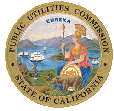 GUIDELINES FOR ACCESS TO
GUIDELINES FOR ACCESS TO
CALIFORNIA PUBLIC UTILITIES COMMISSION RECORDS
Public records maintained by the California Public Utilities Commission (Commission) are
available for inspection by members of the public through the following procedures:
1. Requests for inspection or copying of public records:
· May be verbal or in writing, however, the Commission encourages requests to be made in writing unless the request involves records that are maintained by the Commission for the purpose of immediate public inspection.
· Should be directed to the Legal Division Public Records Office, which will docket the request and contact the unit(s) of the Commission responsible for maintaining the requested records. Address: Legal Division Public Records Office, Attn: Fred Harris, CPUC, 505 Van Ness Ave., San Francisco, CA 94102. Telephone: (415) 703-1557 or (415) 703-2015. Fax: (415) 703-2262. Alternate contacts: News and Public Information Office: (415) 703-1366, news@cpuc.ca.gov; Public Advisor's Office: (415) 703-2074; public.advisor@cpuc.ca.gov.
· Should be specific, focused and sufficiently describe records so that they can be identified, located and retrieved by Commission staff.
· Must not interfere with the ordinary business operations of the Commission. Commission operations will not be suspended to permit inspection of records at a time when those records are in use by Commission staff. If the request requires review of numerous records, a mutually agreeable time will be established for the inspection of the records. Public records maintained by the Commission will be available for inspection during the regular business hours of the Commission.
· Where a request is not specific and focused, Commission staff will assist the requester to identify records and information that are responsive to the request or to the purpose of the request, if stated; describe the technology or physical location of any such records; and provide suggestions for obtaining access to the records or information where such records are not subject to an exemption listed in the Public Records Act.
2. The Commission may refuse to disclose any records that are exempt from disclosure under the Public Records Act. (See Gov. Code, § 6254.)
3. Physical inspection of the records will be permitted within the Commission's offices and under the conditions determined by the Commission. Upon either the completion of the inspection or the oral request of Commission staff, the person conducting the inspection will return the records to the Commission. Persons inspecting Commission records must not destroy, mutilate, deface, alter, or remove the records from the Commission. The Commission reserves the right to have Commission staff present during the inspection of records in order to prevent the loss or destruction of records.
4. Upon any request for a copy of records, other than records the Commission has determined to be exempt from disclosure under the Public Records Act, Commission staff will provide copies of the records to any person after payment of a fee of: 1) 10 cents per page for standard documents; 2) actual costs for reproducing oversize documents or documents requiring special processing; 3) actual postage charges; and 4) actual costs, if any, for retrieval and return of records held offsite in archives. Reasonable clerical charges may be imposed if locating the records and making them available requires special processing: e.g., extensive or complex records or data compilation, redaction, programming, or certification of records. Such charges will be billed at a rate of $24 per hour per person, or $6 per quarter hour. Public Utilities Code § 1903 requires the Commission to set copy fees. The Commission's fees are similar to witness fees in Evidence Code § 1563, and reflect the direct cost of duplicating and providing records, or portions of records, that are not exempt from disclosure. The Commission may waive fees as appropriate. Copies will be provided as promptly as practical. Extensive and complex copy requests may take longer to process than simple ones, and do not pre-empt staff's other duties.
A copy of these guidelines will be posted in a conspicuous public place in each office of the Commission, and a free copy will be made available to any requester.
